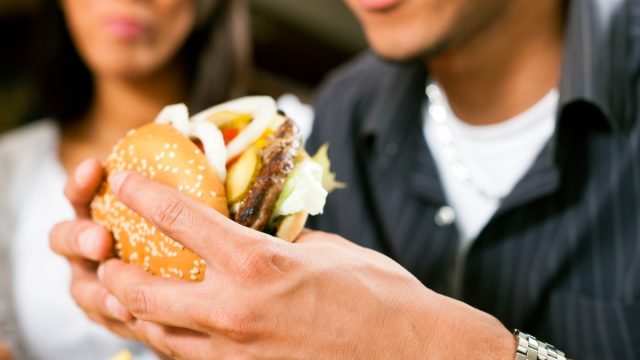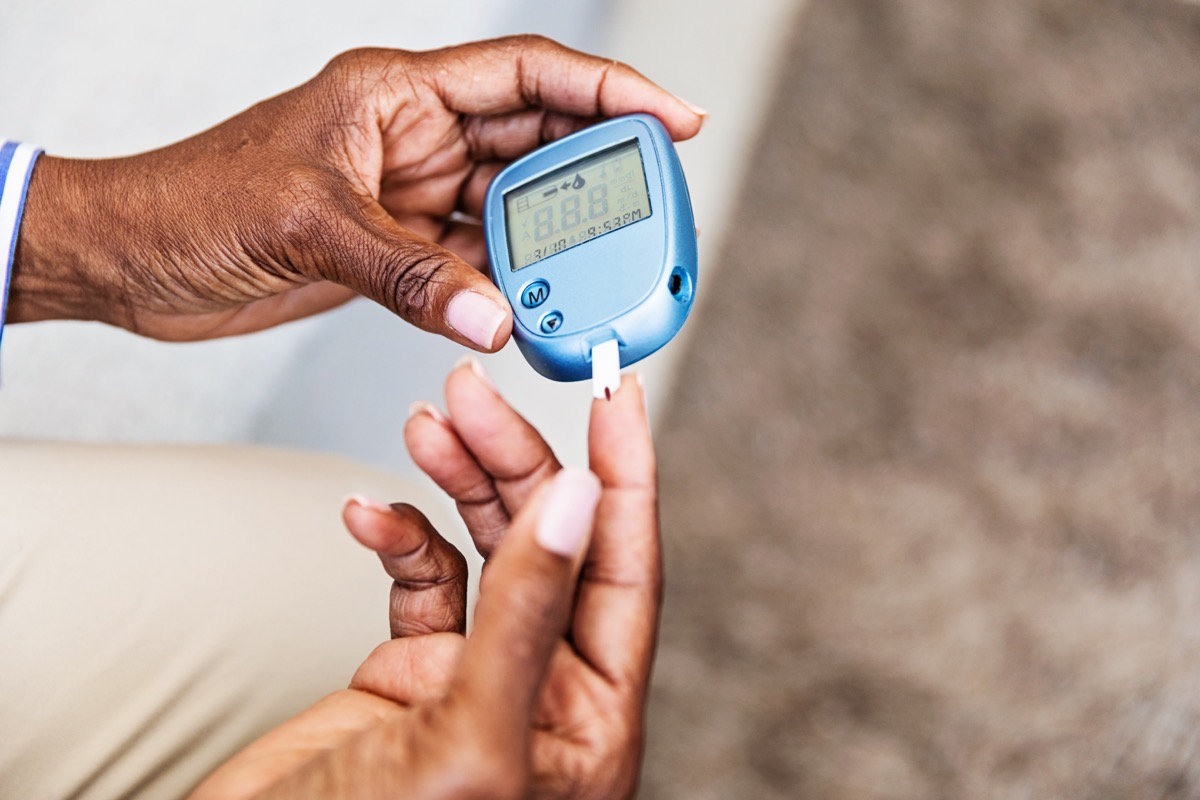What Happens to Your Body If You Eat Fast Food Once a Week
Here's what to expect from a weekly fast food splurge.

When it comes to your diet, most doctors agree: You should be loading up on whole foods that balance complex carbohydrates, healthy fats, lean proteins, fiber, and vitamins and minerals. On your plate, this translates to lots of fresh fruits and veggies, nuts, legumes, grains, and lean meats, fish, and dairy. But what if you treat yourself to fast food, just once a week?
Experts say that it's not just the ingredients in your food that matter—but also how they're prepared. Heavily processed meals found in fast food restaurants are notorious for packing in extra sodium, sugar, saturated fats, and additives, all of which can wreak havoc on your health over time. In fact, the Centers for Disease Control and Prevention (CDC) notes that eating excessive fast food is linked with obesity, high blood pressure, type 2 diabetes, heart disease, and other serious health risks. Despite this, one in three Americans eats fast food every day, according to a survey by the health authority.
Obviously eating fast food once weekly carries fewer risks, but that doesn't mean there are no consequences. Here's why experts say there are potentially serious health risks associated with eating fast food at a more infrequent but still regular rate.
READ THIS NEXT: What Happens to Your Body If You Stop Drinking Caffeine, According to Experts.
1
Your digestion may suffer.

Even if you only eat a single fast food meal weekly, you may notice digestive discomfort afterward. In fact, eating fast food infrequently may mean you're more sensitive to the effects of heavily processed foods.
"Fast food is often low in dietary fiber, which plays a vital role in maintaining healthy digestion," explains Trista Best, MPH, RD, LD, a registered dietician and consultant with Balance One Supplements. "Fiber adds bulk to the stool, aids in regular bowel movements, and supports the growth of beneficial gut bacteria. The lack of fiber in fast food can lead to constipation and irregularity."
Another immediate consequence of eating fast food once a week is that you may notice gassiness or bloating after finishing your meal.
"Fast food is typically high in unhealthy fats, refined carbohydrates, and artificial additives, which can disrupt the balance of gut bacteria. This imbalance, known as dysbiosis, can result in digestive issues like gas, bloating and discomfort," says Best.
2
Your blood sugar may spike.

Since fast food meals often contain large amounts of refined carbohydrates, added sugars, and sugary beverages, eating fast food regularly is associated with higher incidence of type 2 diabetes.
While you're not going to develop diabetes overnight from eating one fast food meal, Meaghan Greenwood, RD, a dietician and health coach working with Hourglass Waist, warns that just one helping of fast food can "cause rapid spikes in blood sugar levels, putting a strain on the pancreas to produce insulin."
"Over time, repeated blood sugar spikes can contribute to insulin resistance, which is a precursor to type 2 diabetes," she adds.
This can also cause immediate problems for anyone who is already considered diabetic or prediabetic. By sticking to a healthy eating plan and preparing your meals at home, you can help limit your risk of unexpected blood sugar spikes.
For more health content sent directly to your inbox, sign up for our daily newsletter.
3
You may raise your heart disease and stroke risk.

Usually, your blood pressure goes down slightly after you consume a meal, Medical News Today reports. In fact, roughly one-third of older adults experience notable postprandial hypotension, hitting their lowest blood pressure reading in the 30 to 60 minutes after a meal.
However, when you eat a salty fast food meal, your blood pressure can instead spike, says Greenwood. Over time, this can pose a problem.
"Consistently consuming high levels of sodium can strain the cardiovascular system and increase the risk of hypertension, heart disease, and stroke," notes the dietician.
In fact, a 2012 study published in the journal Circulation found that eating fast food just once a week raised participants' risk of dying from coronary heart disease by 20 percent, compared with those who abstained. And the more fast food participants ate, the more their risk rose: Those who ate fast food four times per week were 80 percent more likely to die from the same condition, compared with the control group.
4
You may be at higher risk of liver disease.

According to a Jan. 2023 study conducted by Keck Medicine of USC, people who eat at least 20 percent of their calories from fast food are at heightened risk of developing nonalcoholic fatty liver disease, a dangerous condition in which fat builds up in the liver.
"Healthy livers contain a small amount of fat, usually less than 5 percent, and even a moderate increase in fat can lead to nonalcoholic fatty liver disease," Ani Kardashian, MD, a hepatologist with Keck Medicine and lead author of the study, said via press release. "The severe rise in liver fat in those with obesity or diabetes is especially striking, and probably due to the fact that these conditions cause a greater susceptibility for fat to build up in the liver."
For the purposes of the study, the researchers defined fast food as any drive-thru restaurant or restaurant without wait staff—meaning popular food items like pizza and sandwiches were included. This suggests that even individuals who don't think of themselves as regular fast food diners may still be at heightened risk of liver complications.
Best Life offers the most up-to-date information from top experts, new research, and health agencies, but our content is not meant to be a substitute for professional guidance. When it comes to the medication you're taking or any other health questions you have, always consult your healthcare provider directly.





















